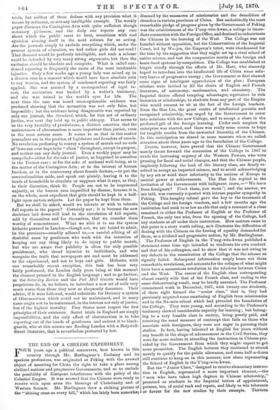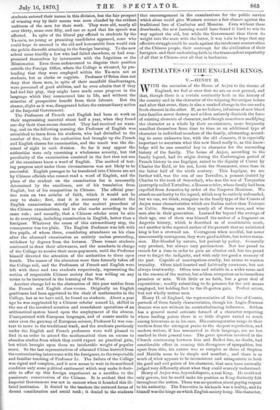THE END OF A CHINESE EXPERIMENT.
FOUR years ago a political manoeuvre, best known in this country through Mr. Burlingame's Embassy and its specious professions, was originated at Peking with the avowed object of asserting for China the right to take a place among civilized nations and progressive Governments, and so to exclude the possibility of European interference with the policy of the Celestial Empire. It was averred that the Chinese were ready to receive with open arms the blessings of Christianity and of Western Science. Mr. Burlingame drew a striking picture of the "shining cross on every hill," which has lately been somewhat
dimmed by the massacres of missionaries and the demolition of churches in various provinces of China. But undoubtedly the most remarkable pledge of progress given by the Government of Peking was the establishment of the T'ung-wen-kwan, a college in imme- diate connection with the Foreign Office, and destined to indoctrinate the Chinese in the learning of the West. The College was not founded without opposition, but the Conservatives of the Imperial Court, led by Wo-jen, the Emperor's tutor, were checkmated for the time by the suggestion that they might set up a rival school of native science, and test the comparative merits of the foreign and home-bred systems by competition. The College was established at length chiefly through the efforts of Mr. Hart; who sincerely hoped to introduce into the intellectual life of China some salu- tary leaven of progressive energy ; the Government at first showed some signs of intelligent appreciation of the plan ; European scholars were invited to fill the chairs of English and French literature, of astronomy, mathematics, and chemistry. The Imperial decree offered tempting advantages, equivalent to rich bursaries or scholarships, to students from any part of the Empire who would consent to sit at the feet of the foreign teachers.
Even the Han Lin, the great centre of intellectual pursuits and recognized scholarship, was urged by the Government to enter into relations with the new College, and to accept a share in the
proferred gift of the foreign learning. Under such auspices the enterprise was started, and there was really some reason to hope
for tangible results from the unwonted liberality of the Chinese. In this anticipation we shared in some measure when we called attention about three years ago to the foundation of the College.
Events, however, have proved that the Chinese Government merely thrust forward the concession of the College in 1867 to evade the increasing urgency of the Western Powers, who were pressing for fiscal and social changes, and that the Chinese people, implicitly following the lead of the literary class, are firmly re- solved to accept no imported science, and to avoid acknowledging by any act or word their inferiority to the nations of Europe in mental power or achievements. The Han Lin replied to the
invitation of the Government with indignant scorn,—" We learn from foreigners? Teach them, you mean"; and the answer, we are told, was currently repeated with intense popular sympathy is
Peking. This haughty refusal gave the key to the treatment of the College and the foreign teachers, and a few months ago the- institution had sunk to so low an ebb that only a remnant of a class remained to either the Professor of English or the Professor of French, the only two who, from the opening of the College, had any students at all under their instruction. How matters came to. this point is a story worth telling, as it illustrates the difficulties of dealing with the Chinese on the footing of equality demanded for them, as a civilized and progressive nation, by Mr. Barlinghame.
The Professor of English in the T'ung-wen-kwan published a statement some time ago intended to vindicate his own conduct
and that of his colleagues, and to show that it was not owing to any defects in the constitution of the College that the scheme so signally failed. Subsequent information amply bears out these remarkable revelations, and accounts for the collapse of what might have been a momentous revolution in the relations between China and the West. The career of the English class corresponding almost exactly with that of the French class, and ending in the same disheartening result, may be briefly narrated. The Professoe commenced work in December, 1867, with twenty-one students,. of these eight formed the " senior class," that is, they had previously acquired some smattering of English from missionaries and in tke Na-men school which had preceded the foundation of the College. They were young, and according to the Professor's.
testimony showed considerable capacity for learning ; but belong- ing to a very humble class in society, being poorly paid, and receiving the usual measure of contempt that falls on those who associate with foreigners, they were not eager in pursuing their studies. In fact, having laboured at English for years without any benefit in the shape of advancement in the Civil Service, they were far more zealous in attending the instruction in Chinese pro- vided by the Government from which they might expect to get. some promotion. The English lectures they continued to attend, merely to qualify for the public allowance, and some half-a-dozen still continue to hang on in this manner, now alone representing the School of English in the T'ung-wen-kwan.
But the " Junior Class," designed to receive elementary instrua- don in English, represented a more important element,—the " men who have taken high degrees in Chinese scholarship,' promised as students in the Imperial letters of appointment, persons, too, of social rank and repute, and likely to win tolerance or favour for the new studies by their example. Thirteen Missionaries. Even these endeavoured to disguise their position outside the Foreign Office, where the College is situated, by pre-
tending that they were employed within the Ya-men not as ESTIMATES OF THE ENGLISH KINGS.
students, but as clerks or copyists. Professor O'Brien does not • deny that these men, in spite of their manifold disadvantages, V.--HENRY II.
terms to be instructed in the learning of the West. promises or acts. With little or no faith, but a great deal of Another change led to the abstraction of this poor residue from superstition ; readily submitting to do penance for the evil means the French and English class-rooms. Originally an English employed, but holding fast to the ill-gotten gain. Perfect actors, gentleman had been appointed to the chair of mathematics in the but not wholly untrue men.
College, but as we have said, he found no students. About a year Henry II. of England, the representative of this line of Counts, ago he was supplanted by a Chinese scholar named Li, skilled in partook of these family characteristics, though his Anglo-Norman the use of the involved notation and roundabout operations of an descent was not without its counterbalancing influences. Seldom arithmetical system based upon the employment of the abacus. has a general moral estimate formed of a character respecting Unacquainted with European languages, and of course unable to whose leading points there is so little dispute varied so much enter even the gateway of European science, Professor Li was con- among historians as in his case. His contemporaries range in their tent to move in the traditional track, and the students previously verdicts from the strongest praise to the deepest reprobation, and under the English and French professors were well pleased to modern writers, if less unreserved in their language, are no less find in an order to attend the mathematical class an excuse to marked in their general tone. The great question involved in the abandon studies from which they could expect no practical gain, Church controversy between him and Becket has, no doubt, had
but which brought upon them an intolerable weight of popular considerable effect in causing this divergence of sympathies, but acorn. So the last representatives of educated China hurried from apart from this, his nature was as complex as those of Stephen
the contaminating intercourse with the foreigners, to the respectable and Matilda seem to be simple and manifest ; and there is so and familiar teaching of Professor Li. The failure of the College much of,what appears to be inconsistent and antagonistic in both was signal and complete, and it now seems to wait in its moribund the good and evil points of his character, that men have naturally condition only some pzlitical excitement which may make it desir- judged very differently about what they could scarcely understand. able to offer up this foreign experiment as a sacrifice to the Henry of Anjou was, beyond dispute, a real King. He could not passionate conservatism of the Chinese. It is evident that the only govern, but he could make his position as King distinctly felt































 Previous page
Previous page